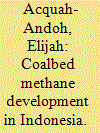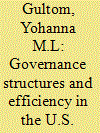|
|
|
Sort Order |
|
|
|
Items / Page
|
|
|
|
|
|
|
| Srl | Item |
| 1 |
ID:
166730


|
|
|
|
|
| Summary/Abstract |
Due to increasing demand for natural gas in Indonesia, the Government now promotes exploration for coalbed methane (CBM). Currently, Indonesia has 453 trillion cubic feet (TCF) of CBM reserves. However, CBM development in the country is still in the exploration phase, with significant under-investment. To attract investors, a tailored Production Sharing Contracts (PSC) regime is required. Based on a combination of Factor Analysis (FA), Discounted Cash Flows (DCF) and Parameter Sensitivity Analysis, the research explores an optimal scenario of a company's share of revenue that optimised CBM development contracts. We find that a combination of 5 years straight line depreciation (SLD), 5% First Tranche Petroleum (FTP), 78% Contractor Share (CS) and 35% income tax best spreads the risk of CBM development and exploitation between the government and the contractor. This combination is a more suitable PSC regime for developing CBM in an early stage of the industry. Therefore, the Government must cede some taxes during exploration to incentivise CBM development. Three PSCs regimes are thus required to fully develop and exploit CBM, including exploration, transitional and exploitation phase PSCs which better match contractor risks and returns and ensure reasonable certainty of contractor cost recovery.
|
|
|
|
|
|
|
|
|
|
|
|
|
|
|
|
| 2 |
ID:
125559


|
|
|
|
|
| Publication |
2013.
|
| Summary/Abstract |
This paper analyzes the pro-competitive effects of financial long-term contracts in oligopolistic electricity markets. This is done in a model that incorporates the main features of the industry: non-storable production, time-varying price-elastic demand, and sequential investment and production decisions. The paper considers contracts for difference that have as reference price the average spot price. Assuming that the spot market coordinator sets competitive prices, the paper shows that installed capacity increases with the quantity of energy contracted, reaching the welfare-maximizing capacity when energy contracted equals this same level. Next, the paper studies the case where the quantity of energy contracted is endogenous and contracts are traded before capacity decisions are taken. Regarding purchasers of contracts, two polar cases are considered: either they are price-taker speculators or they are an aggregation of consumers that auctions a long (buy) contract for a given energy quantity. In the former case the strike price equals the reference price, i.e., arbitrage is perfect, and the quantity of energy contracted falls short of the efficient level. In turn, in the latter case, the strike price equals the average efficient spot price. Moreover, an aggregation of all consumers would choose to auction the social optimum quantity.
|
|
|
|
|
|
|
|
|
|
|
|
|
|
|
|
| 3 |
ID:
166478


|
|
|
|
|
| Summary/Abstract |
In some U.S. states that have undergone electricity market restructuring and deregulation, investor-owned utilities (IOUs) were required to divest the majority of their generation assets in order to purchase power from merchant generators, independent power producers, and power marketers competing in the new wholesale market. This paper examines the effect of the governance structures used to purchase power in the wholesale market, the bilateral forward contracts and market transactions, on the technical efficiency of IOUs during the post-divestiture period. Using a two-stage empirical strategy (the non-parametric data envelopment analysis and the difference-in-differences regression approach), I analyze the performance of 152 distribution utilities in the U.S. from 1994 to 2015. The results show that while the use of contracts has no significant effect, the use of market transactions has a significant negative effect on IOU technical efficiency. Trading arrangements in the restructured wholesale markets that rely on the concept of competition generate transaction costs that make it more costly for the utility to use market transactions rather than other alternatives. Thus, market transactions fall short to promote the efficiency purpose of IOUs as an economic organization in this policy-induced market and the adverse effect persists until 20 years after the divestiture.
|
|
|
|
|
|
|
|
|
|
|
|
|
|
|
|
| 4 |
ID:
098444


|
|
|
|
|
| Publication |
2010.
|
| Summary/Abstract |
The author has taught international business negotiation in a wide variety of university courses and executive training programs throughout the world during the last three decades. He has taught international business negotiation both as an end in itself and as a means to teach law, an approach that he calls "the law in the shadow of negotiation." This article examines three fundamental dimensions of that experience: pedagogical goals, course content and teaching methods. His principal pedagogical goals in international business negotiation courses have been three-fold: better negotiation analysis, improved negotiation skills, and increased international business knowledge. Depending on the time available, the content of his international business negotiation courses covers three broad areas: the fundamentals of conflict analysis and the negotiation process, basic themes in international negotiation, such as the importance of negotiation, preparation and the management of internal negotiations, and the special obstacles faced in international business negotiation, such as cultural differences among the parties, the actual or potential role of governments in the negotiation process, and challenges to the stability of negotiated agreements. The author's teaching relies heavily on experiential methods and materials, such as exercises, simulations and cases, although more didactic methods also have a role.
|
|
|
|
|
|
|
|
|
|
|
|
|
|
|
|
|
|
|
|
|